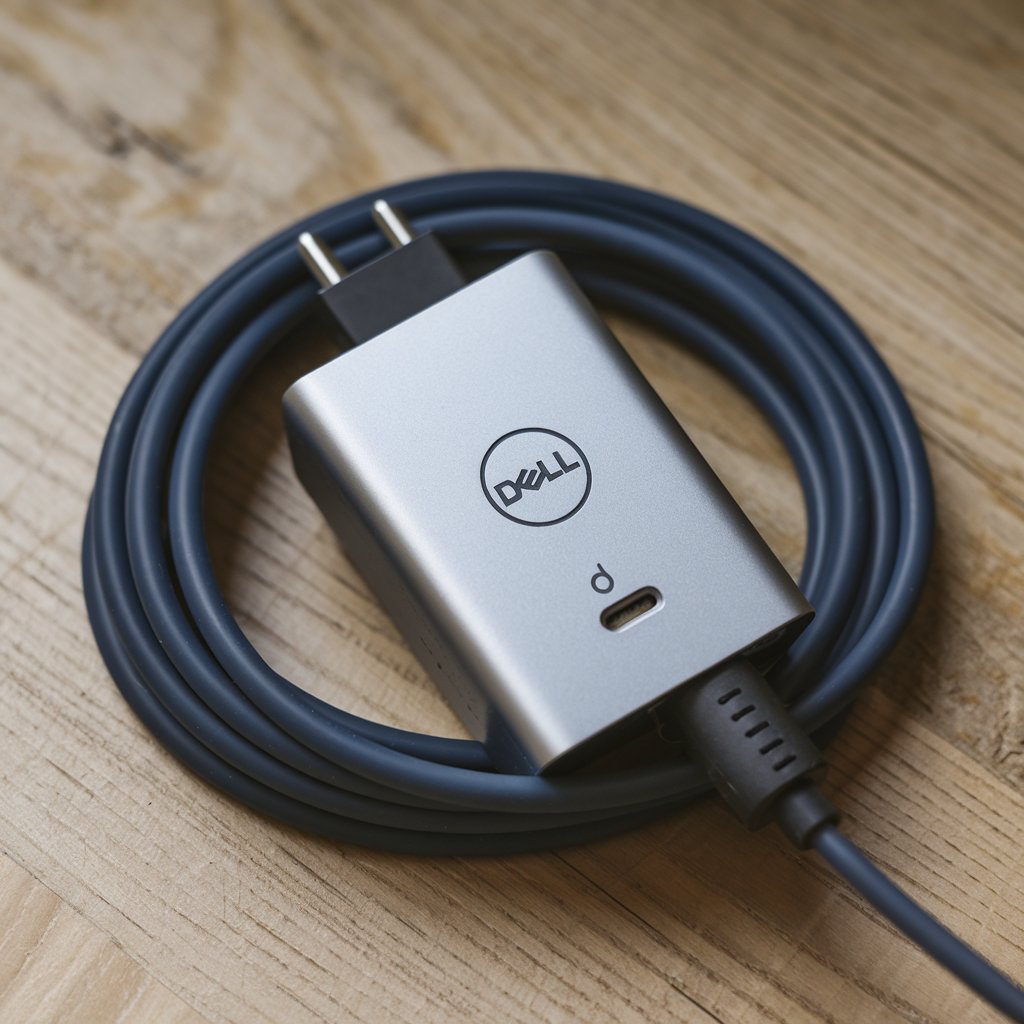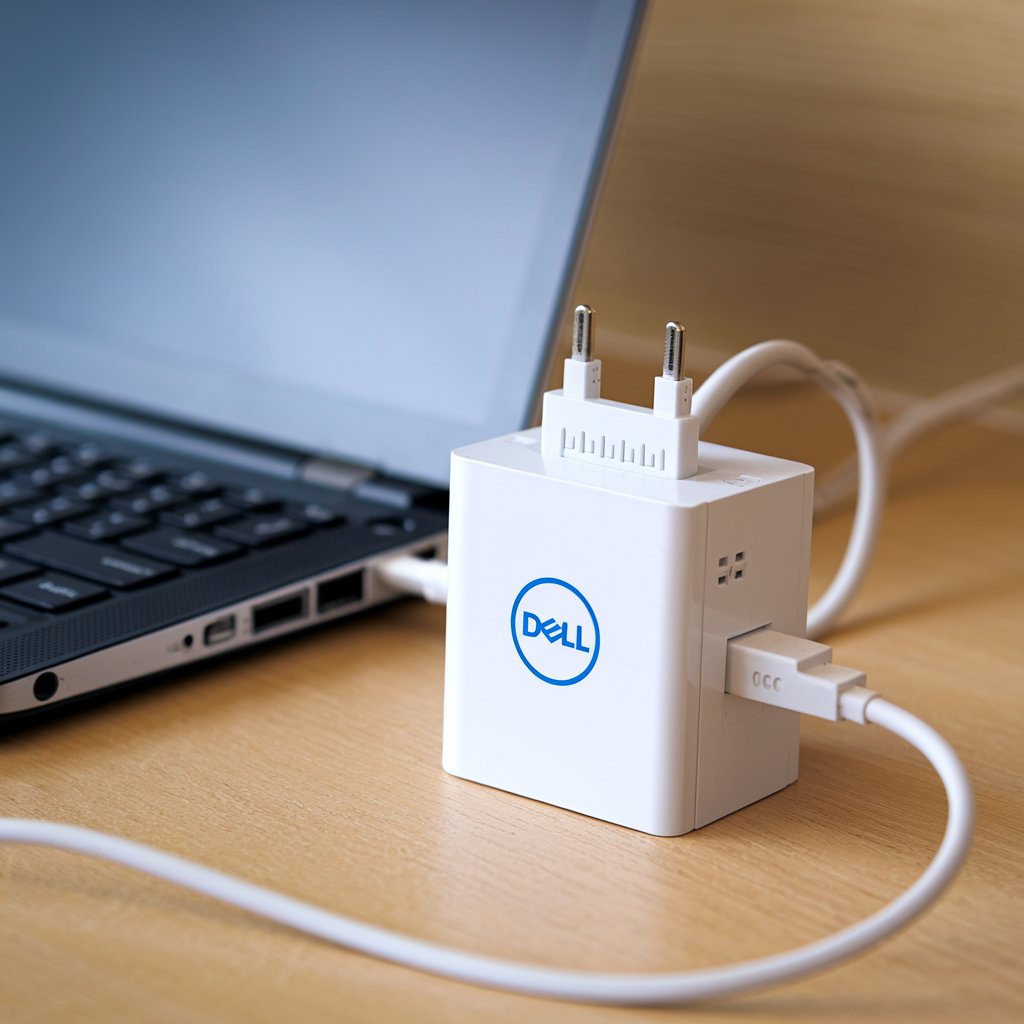INTRODUCTION
Safely and Efficiently Charging Your Laptops with Dell Laptop Chargers: Comprehensive Guide Introduction In a laptop, the charger is among those things very few people appreciate until the time it gets misplaced or faulty. A good laptop charger means everything goes smooth-sailing from the perspective of your device’s performance, battery life, and overall longevity. Dell is one of the leading brands in laptops, sales, and manufacture. The company provides several chargers in regard to its laptop products. These chargers are not just about powering your laptop up but making sure the device operates efficiently and safely, lasting as long as possible.
This comprehensive guide is meant to help understand everything one wants to know about Dell laptop chargers, from selection to troubleshooting. I will be sharing a few personal stories to explain just how important it is to understand and take good care of your laptop charger.

Why the Right Charger Matters?
Table of Contents
Power Compatibility and Performance
Above all, all the laptop chargers should work with your device accordingly.
Incompatible chargers with your laptop may result in a lack of efficient charging, poor performance, and may cause damage to your laptop.
Since Dell chargers are designed to meet the specific Dell laptop needs, they will provide exactly the amount of power which is needed by your device.
Personal Experience: The Danger of Using a Non-Compatible Charger
It reminded me of a business trip several years ago when, for the first time, I had forgotten my Dell charger at home.
I had to borrow immediately from one of my colleagues who used another brand of a laptop. Although it seemed it would work just fine, my laptop started malfunctioning in just a matter of hours: slower processing, random shutdowns, and the excessively heating battery. That was when I realized that the borrowed charger was on the wrong voltage and my terrible performance and overheating of my laptop on account of that. This experience taught me the painful way that not all chargers were created equal, and making use of another than the correct would result in rather serious results.
Battery Health and Longevity
Your laptop battery’s health is associated with the charger used. Mainly, Dell chargers are made in a way that they work within an optimal charging rate, and these usually contribute much to battery health over time. The low-quality charger will make the battery deteriorate faster, hence making the general life of your gadget shorten.
Safety Considerations
The other major determining factor would, of course, be the question of safety: low-quality chargers may overheat, create a short circuit, and even catch fire-a factor that would put your laptop and personal safety in great jeopardy. Dell’s genuine chargers have been well tested for safety in order to protect against such hazards.

Dell Laptop Chargers: An Understanding
With different models of Dell chargers targeted towards different types of laptops, little understanding of major specifications will help you make a correct choice while buying or replacing your charger.
Voltage and Amperage: The Core Specifications
The two major specifications defining the power output of a charger are voltage and amperage. Voltage can be defined as electrical potential delivered by the charger, while amperage is basically a measure of flow. The voltage of most Dell chargers is 19.5V, which just happens to be standard on most their models. That is something that really needs to exactly match the requirements of your laptop.
Amperage: This varies by different models and their operational needs. Similarly, the more the amperage, the much more abilities the charger will have in terms of giving out much more power that might be needed by laptops when mounting power hungry components such as a discrete GPU or even an efficient processor.
Wattage: Power Delivery and Charging Speed
The basic principle behind wattage is voltage times amperage, W = V × A. This generally specifies how much power a charger can deliver. Ordinarily, Dell makes chargers in a range from 45W up to 130W. The proper wattage will keep your laptop charging correctly and operate as it should.
The low wattages: 45W – 65W will be enough for low-consumption and small-size laptops, like ultra-books.
Higher wattage-90W-130W-high performance, laptop usages would require gaming laptops or workstations.
The type of connector also varies according to Dell models. Some of them are listed below:
Barrel Connector: The traditional round connector with a central pin is used by most of the older and mid-range models.
USB-C: Newer, reversible connectors are the more modern standards used on ultra books and 2-in-1 devices.
Slim Tip: A rectangular connector found in some premium models.
The wrong connectors can block the charging and even lead to ruining the charging port; hence, a correct one has to be chosen.
Original Charger versus Third-Party Chargers: What Is the Difference?
While third-party chargers may look very economical, they surely do lack in quality control and compatibility that one expects from an authentic Dell charger. The Dell chargers have been specifically designed to go with their laptops. They have the voltage matched up just right, the amperage is proper, and the correct type of connector. Third-party chargers cannot warrant the same level of safety or performance and may even cause damage or a safety hazard.

My Experience with Third-Party Chargers
So, I went for another third-party one that fit my Dell laptop, and for some months everything was great, but in time it developed a bunch of problems: slow charging, unstable contacts, the general decline of performance. Sometime later, it finally died on me, and I had to get an OEM Dell charger. It served again as an experience that had much to teach me, and again it showed that investment in quality, manufacturer-approved chargers was well worth the cost.
How to Choose the Right Dell Laptop Charger
Choosing the right charger by Dell requires much more than just fitting your laptop. Here’s a step-by-step guide to ensure that you make it right.
1. Check Your Laptop’s Specifications
First, check your laptop for its specification before buying a charger. This may be found on a sticker at the bottom of your laptop, in the user manual, or by searching on Dell’s official website for your model. Pay close attention to the following:
Model Number: It will give you an idea about which charger it is that you should buy.
Voltage and amperage requirements: these are to be exact according to your charger.
Type of connector: bear in mind that the charger connector fits your laptop charging port.
2. Usage Needs
According to your needs, select a charger in response to how and where you want to use it:
Home or Office Use: You would need a simple charger with appropriate wattage if not that mobile with your laptop.
Out of Town Trip: It would be much more convenient for a traveler to bring a compact charger or one designed with dual voltage for international use.
Performance Use: What is also noteworthy is that buying a higher wattage charger would pay off when you used your laptop in playing games, video editing, or other power-consuming applications because it can give pace to your performance.
3. Buy from Reliable Sources
This will always get you buying your charger from an authorized reputable source: from Dell’s official website or stores. This reduces the possibility of buying counterfeit or low-quality products that may harm your laptop or pose unsafe usage.
4. Extra Features
Some Dell chargers come with extra features that might make your experience just that little more pleasant:
LED Indicators: Some chargers have LEDs to indicate whether the charger is properly connected and charging.
Surge Protection: A few of them have surge protection inbuilt into the design and that will go a long way in safeguarding your expensive laptop from sudden power surges and electrical spikes.
Cable Length: Have a look at the length of the cable on these chargers. The longer the cable, the more leeway you would have as to where you could place your laptop while you work on it.
5. Mistakes to Avoid
Following are some of the general mistakes one should avoid in selecting a charger for a laptop.
Not taking a look at the specifications: One must make sure the specifications of the charger go along with what the intended laptop requires; it may bring down the computer by the difference in voltage or the rate of flow.
Costly knockoffs: The cheap chargers may save you some bucks at first, mostly, but the standards regarding their safety and quality are not met as compared to a genuine Dell charger.
Not check on Warranty: Typically, a genuine Dell Charger has a warranty-a guarantee covering defective items.

Common Dell Laptop Charger Problems and How to Solve Them
Even with a good-quality charger, there is a prospect of certain problems. Some of the common problems and their remedies go as follows:
1. Charger Not Detected in the Laptop
Many times, a laptop doesn’t detect charging, and sometimes it displays messages like “Plugged in, not charging.” Causes can be as follows:
Loose Connection: First of all, make sure that your charger is connected properly with both the laptop and power outlet.
Dust/Debris: The charging port has dust, which interferes with the connection. Clean the ports of dust using compressed air or do so lightly with a soft-bristled brush.
Bad Charger: If it still creates a problem, then try to use the charger with any other Dell laptop model that it is compatible with. And if it doesn’t work, then probably it is defective and needs to be replaced.
Dust Intervention: Coping with a Dusty Port
I vaguely remember that, sometime this past winter, my Dell laptop wouldn’t charge as it should. Tracking the problem down, I was finding a dust-choked charging port A single puff of compressed air cleaned the junk out, and the charger worked just fine. It saved me much stress and money, and it was easy to do. 2. Overheating Charger
If your charger overheats, then it might be because of the following:
Insufficient Ventilation: The charger must be placed in a well-ventilated area, and it must not be covered by stuff that will retain heat.
High Power Application: The charger can get warm when using power-consuming applications while the phone is being charged. You may want to close other applications to cool down your charger or make the workload lighter.
Bad Charger: In case of overheating, this may be the indication that there is something wrong with the charger. Should it would still persist with heating problems, immediately change the charger before it causes some potential damage to your laptop or creates any fire hazard.
3. Frayed or Damaged Cables
The fact that they always stay bent or twisted exposes such charger cables to a worse wear-and-tear situation. Frayed or damaged cables result in inconsistent charging, or it can be dangerous even.
Quick Fix: Apply electrical tape on the torn part for a do-it-your-fast fix. Replace the charger as soon as possible.
Stopping it before it starts: don’t coil your cord too tightly; also look for ways of storing the charger that stress the connecting point less.
Story: When a quick fix is no good.
It took only a couple of years to find that my Dell charger’s cable became a little frayed around the connector; at least, I thought it would need to last until replacement, so I put electrical tape on it. The problem was more serious, though, and after about a week, it ceased to function altogether. The lesson learned from that was never to procrastinate where replacements are necessary; sometimes temporary just won’t suffice.
4. Charger Not Working at All
If your charger isn’t working, then here are a few steps to troubleshoot it that you can go ahead and try:
Test the Outlet: Plug in another device on the same outlet to confirm this outlet is providing power for.
Try using the Charger on another compatible Dell Laptop: If that doesn’t work, then replacement may become imperative.
Damage: Any physical or visual damage on the charger, cable or any connector would make the replacement of the charger indispensable.
5. Slow Charging
If you feel that your laptop is taking a longer amount of time to charge, then some of the places you check include:
Power source: Low-power sources charge your machine much more slowly when compared to high-power sources. Charging speeds faster if the charger is plugged directly into a wall outlet.
Charging your computer when you are running power-consuming applications makes it charge more slowly. Closing some applications might solve your problem and give you faster charging. Battery Health: Over a series of years, your laptop’s battery may lose its fast charging ability. If you are still using the same battery after a couple of years, then it is high time to replace it.
How to Extend the Life of Your Dell Laptop Charger
Caring and using good maintenance practices will ensure that your Dell charger serves you for the coming years.
1. Handle with Care
You are not supposed to pull the charger’s cable from either your laptop or from the wall socket. You are instead advised to disconnect the charger while holding onto the connector. This is to avoid straining the wire hence breaking the connector.
2. Store Properly
Store your charger in a cool and dry place when not in use. Also, do not wrap the cable too tightly since this may bend or break the wire inside in some time. If possible, it is good to have a cable organizer so that the cable will not deteriorate that easily.

3. Avoid Overheating
Always let your charger breathe while in use. Try not to charge your phone on soft surfaces that store heat without allowing ventilation, like a bed or sofa. This of course would mean that you should allow it to rest and cool off at times that you feel your charger getting hotter than usual.
4. Periodic Check-Up
Periodically, always check your charger for any signs of damage, such as frayed cables or loose connectors. That way, you could locate minor problems before they become major ones.
5. Replace When Necessary
Even with the best care possible, chargers still do not last. When your charger is already worn out, showing wires, a loose connector, or any other weakening signs in charging your laptop, it is best to change it with another one. You would not want to continue using a damaged charger that may eventually damage your laptop and even pose a risk to your safety.
Conclusion
One would think the charger is quite an inane accessory to the laptop, but instead, it does much in providing vital means concerning device performance, battery health, and safety. Dell chargers are basically designed with these factors in mind by using reliable power delivery with durable longevity.
I have felt the difference it makes, using both genuine and third-party chargers. A good charger is worth every penny invested in it. With that in your pocket, you know what your particular laptop needs; now find the perfect charger and properly take care of it to keep it powering up your Dell safely for many years.
But next time you’re shopping for a new charger, remember: not all chargers are created equal. Choose properly and your laptop will reward you.
